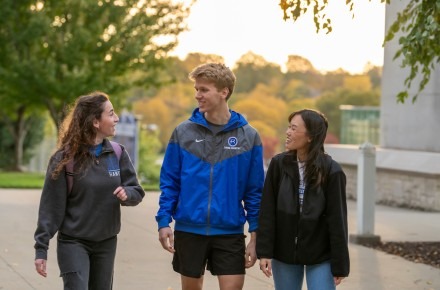A communication minor from Rockhurst University focuses on the communications process, methods of interpersonal and mass communication, as well as how to improve communication skills for yourself and among your future workplace team.


Program Overview
Our communication minor emphasizes areas such as listening and group communication skills, journalism, public relations and advertising.
Our liberal arts tradition makes Rockhurst one of the best communications schools in the region because our communication graduates can seamlessly integrate a unique set of communication skills in the real world.
Learning Outcomes
- Develop skills in human or mass communication.
- Apply methods of communication to real-life contexts.
- Learn and apply communication theory.
Program Outcomes
What can you do with a communication education? Communications jobs include areas such as:
- Advertising
- Public relations
- Human resources
One big question many students have is: Is a communication education worth it? The answer is yes. It is a stimulating field that offers endless possibilities. Communication degree graduates work in almost every industry you can think of, from health care to government to digital marketing and beyond.
Communication tutors
Outstanding communication students serve as tutors in Rockhurst’s Learning Center. Communication tutors help Rockhurst students with oral presentation skills and with speech writing. Through tutoring, communication tutors deepen their understanding of the subject and sharpen valuable skills in communication and interpersonal relations. Tutors also gain valuable information about topics such as learning styles, active listening, effective questioning and setting goals for tutoring sessions.
Course Map
Degree and class descriptions and requirements can be found by clicking on the course catalog listings below:
Degree Info
- Students are encouraged to complete internships while completing their communication degree. Internships have been completed at top companies that offer jobs for communication majors such as Lockton, Cerner, and FleishmanHillard.
- Students work with a local organization for their capstone project, where they identify communication issues and make recommendations to the organization.
- Students have the opportunity to participate in the communication speed networking event where they can hear from communication professionals.
- Students have the opportunity to earn a bachelor's and master's degree in only five years!
Find Your Program
Choose topic to quickly find specific program details
